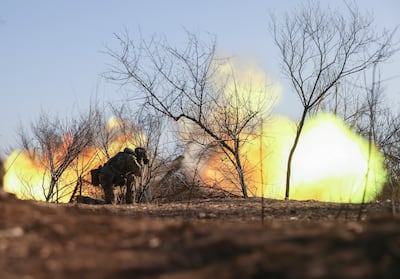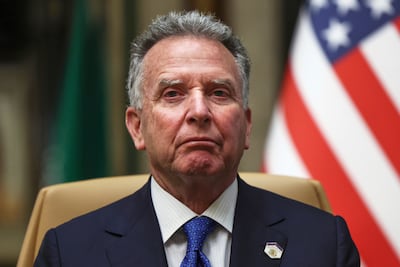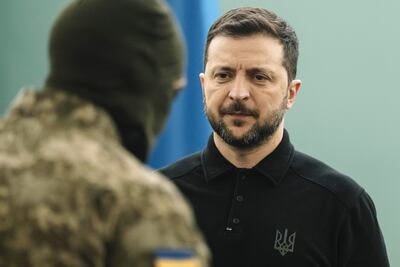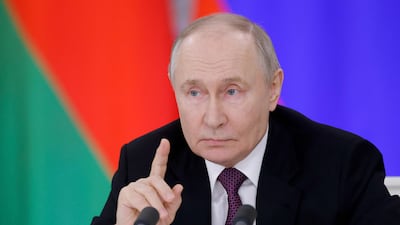Russian President Vladimir Putin is doing all he can to stall the implementation of a ceasefire with Ukraine, despite agreeing "in principle", because he has little incentive to end the fighting, analysts have told The National.
The Kremlin believes that it is now in such a strong position that laying down weapons would hamper the maximalist aims of taking all Ukraine and evicting Nato from Eastern Europe.
Layla Guest, a Russian analyst at the Sibylline geopolitical intelligence firm, said that it was “just not in Russia's interests to do this at present,” while it was “making more progress in expelling Ukrainian forces”.
President Volodymyr Zelenskyy accused Mr Putin on Friday of sabotaging diplomatic efforts to secure peace in Ukraine, over the Russian leader's response to a US-Ukrainian proposal for an unconditional 30-day ceasefire.
"He is now doing everything he can to sabotage diplomacy by setting extremely difficult and unacceptable conditions right from the start even before a ceasefire," Mr Zelenskyy said in a post on X.
Across the frontline Russian forces are making incremental but solid advances while some observers also believe the Ukrainians are at the point of exhaustion.
Ukraine, under severe military pressure on parts of the front line three years after Russia’s full-scale invasion, has already endorsed the truce proposal. Russia’s army has gained battlefield momentum, and analysts say Mr Putin likely will be reluctant to rush into a ceasefire while he feels he has an advantage. The Russian army, backed by North Korean troops, is now close to completely driving Ukrainian forces from their foothold in Russia's Kursk border region in what would be a major setback for Kyiv.
Ukraine's General Staff, however, denied on Friday that its forces in Kursk were encircled by Moscow's troops, and said that any reports to that effect were “fabricated by the Russians for political manipulation and to exert pressure on Ukraine and its partners”.
The question arises as to what US President Donald Trump, who had adopted a very pro-Russian position, can now do with what appears to be a clear rebuttal after he pressured Ukraine into accepting a 30-day ceasefire.
Steve Witkoff, the US special envoy sent to Moscow on Thursday to discuss the deal and who was apparently left to wait eight hours for the meeting, will now be debriefing his president.

A possible phone call between Mr Putin and Mr Trump to settle outstanding ceasefire issues could be arranged after Mr Witkoff delivers messages to Washington, Kremlin spokesman Dmitry Peskov said. “There is an understanding on both sides that such a call is needed,” Mr Peskov said.
“There are certainly some grounds for cautious optimism,” Mr Peskov said of the ceasefire proposal. “A lot still needs to be done, but the President has shown solidarity with President Trump’s position.”
What he is unlikely to say is that Mr Putin has cleverly played the peace overtures to his advantage, and may well be the one, to use Mr Trump’s Oval Office phrase, who “holds the cards”.
Stalling for demands
Mr Putin is stalling, knowing that the initiative has been handed to Russia, said Keir Giles, Russian military expert at the Chatham House think tank. "He has no interest in ceasing offensive operations when he still thinks it’s going Russia's way.
“So it's not surprising that they haven't welcomed this with open arms and laid down their weapons. Because why would they? It's a perfect opportunity for Russia to put forward additional demands.”

Furthermore, the idea of having a European deterrent force on the doorstep, which is currently being proposed, is the “the very last thing that Russia wants” as it would inhibit any future territorial ambitions, said Mr Giles.
“Putin’s ceasefire proposals are just another means by which Russia can string the process out while still pushing forward military advantage as continuing the war is in Putin's best interest."
Those counter-demands, such as stating Nato goes back to its 1997 alliance members – removing among others, the Baltic States, Sweden and Finland – were clearly unacceptable.
And his call for military aid and training to stop in Ukraine leaving the country even more vulnerable were equally impossible.
“We can already see that Putin is trying to undermine the process by raising additional questions and propositions,” said Ms Guest.
Victory in Ukraine
What is also clear, according to a well-placed intelligence source, was that Mr Putin was wedded to his maximalist aims of getting Ukraine to be part of Russia, and Nato away from his borders.
“Putin still thinks that he can win total victory in Ukraine,” said the source. “If you look at Putin's root causes for his illegal invasion then you understand why a ceasefire is as far from his mind as possible.”

“Putin is going to stick to his objectives of having a Ukraine that's effectively a Russian puppet state and reducing Nato presence in Eastern Europe and EU influence,” said Brig Ben Barry, of the International Institute for Strategic Studies think tank
The next step for Mr Putin after making demands to which Ukraine cannot agree would be, according to Kremlin sources reported in Russian media, to remove Kyiv from talks while engaging with Washington then continue its military advances to strengthen its negotiating hand.
This was part of a deliberate ploy to push America “to renegotiate its deal with Ukraine on the temporary ceasefire,” reported the Institute for the Study of War think tank.
“Putin is holding the ceasefire proposal hostage and is attempting to extract pre-emptive concessions ahead of formal negotiations to end the war,” it added.
What next?
“If this is a game of chess, Putin is the grand master, he’s made all the clever moves and maybe Trump is not in checkmate, but he’s certainly in check,” said military analyst Hamish de Bretton-Gordon, a former British army officer.
“Putin is the master strategist here and while Trump might be the master businessman this is where business acumen and global geopolitical strategy do not match.”
If Mr Trump is in “check” what could be his next move? Sanctions appear to be the most obvious move, despite Russia being the most sanctioned country in the world, but he may also decide to give Ukraine much greater military support.
For Mr Trump it is a question of whether he understands the rejection and then what to do next.
In addition to sanctions or expelling Russian diplomats, he could double down on military support for Ukraine, with more advanced military hardware and greater Nato involvement.
Russia’s losses in Ukraine have been huge, perhaps more than 150,000 dead and a huge depletion of its armoured vehicle inventory.
The economy is said to be teetering on the edge of implosion, so perhaps if Mr Trump holds his nerve, blames Mr Putin for rejecting his ceasefire plan then he might bring him back to the negotiating table. For now, the Russian leader just has to contentedly sit back and wait to see what move his opponent's might make.
In the meantime it is now Europe that has to prepare for war.


